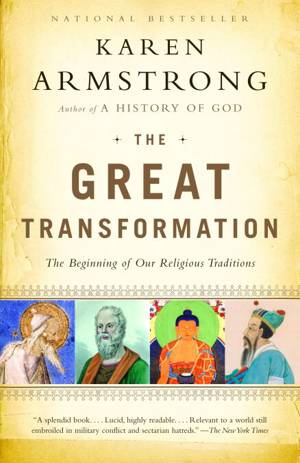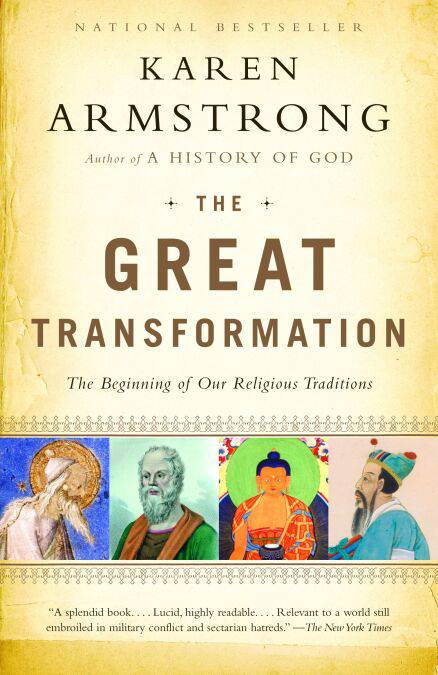
- Retrait gratuit dans votre magasin Club
- 7.000.000 titres dans notre catalogue
- Payer en toute sécurité
- Toujours un magasin près de chez vous
- Retrait gratuit dans votre magasin Club
- 7.000.0000 titres dans notre catalogue
- Payer en toute sécurité
- Toujours un magasin près de chez vous
The Great Transformation EBOOK
The Beginning of Our Religious Traditions
Karen Armstrong
Ebook | Anglais
21,69 €
+ 21 points
Description
From one of the world’s leading writers on religion and the highly acclaimed author of the bestselling A History of God, The Battle for God and The Spiral Staircase, comes a major new work: a chronicle of one of the most important intellectual revolutions in world history and its relevance to our own time.
In one astonishing, short period – the ninth century BCE – the peoples of four distinct regions of the civilized world created the religious and philosophical traditions that have continued to nourish humanity into the present day: Confucianism and Daoism in China; Hinduism and Buddhism in India; monotheism in Israel; and philosophical rationalism in Greece. Historians call this the Axial Age because of its central importance to humanity’s spiritual development. Now, Karen Armstrong traces the rise and development of this
transformative moment in history, examining the brilliant contributions to these traditions made by such figures as the Buddha, Socrates, Confucius and Ezekiel.
Armstrong makes clear that despite some differences of emphasis, there was remarkable consensus among these religions and philosophies: each insisted on the primacy of compassion over hatred and violence. She illuminates what this “family” resemblance reveals about the religious impulse and quest of humankind. And she goes beyond spiritual archaeology, delving into the ways in which these Axial Age beliefs can present an instructive and thought-provoking challenge to the ways we think about and practice religion today.
A revelation of humankind’s early shared imperatives, yearnings and inspired solutions – as salutary as it
is fascinating.
Excerpt from The Great Transformation:
In our global world, we can no longer afford a parochial or exclusive vision. We must learn to live and behave as though people in remote parts of the globe were as important as ourselves. The sages of the Axial Age did not create their compassionate ethic in idyllic circumstances. Each tradition developed in societies like our own that were torn apart by violence and warfare as never before; indeed, the first catalyst of religious change was usually a visceral rejection of the aggression that the sages witnessed all around them. . . .
All the great traditions that were created at this time are in agreement about the supreme importance of charity and benevolence, and this tells us something important about our humanity.
In one astonishing, short period – the ninth century BCE – the peoples of four distinct regions of the civilized world created the religious and philosophical traditions that have continued to nourish humanity into the present day: Confucianism and Daoism in China; Hinduism and Buddhism in India; monotheism in Israel; and philosophical rationalism in Greece. Historians call this the Axial Age because of its central importance to humanity’s spiritual development. Now, Karen Armstrong traces the rise and development of this
transformative moment in history, examining the brilliant contributions to these traditions made by such figures as the Buddha, Socrates, Confucius and Ezekiel.
Armstrong makes clear that despite some differences of emphasis, there was remarkable consensus among these religions and philosophies: each insisted on the primacy of compassion over hatred and violence. She illuminates what this “family” resemblance reveals about the religious impulse and quest of humankind. And she goes beyond spiritual archaeology, delving into the ways in which these Axial Age beliefs can present an instructive and thought-provoking challenge to the ways we think about and practice religion today.
A revelation of humankind’s early shared imperatives, yearnings and inspired solutions – as salutary as it
is fascinating.
Excerpt from The Great Transformation:
In our global world, we can no longer afford a parochial or exclusive vision. We must learn to live and behave as though people in remote parts of the globe were as important as ourselves. The sages of the Axial Age did not create their compassionate ethic in idyllic circumstances. Each tradition developed in societies like our own that were torn apart by violence and warfare as never before; indeed, the first catalyst of religious change was usually a visceral rejection of the aggression that the sages witnessed all around them. . . .
All the great traditions that were created at this time are in agreement about the supreme importance of charity and benevolence, and this tells us something important about our humanity.
Spécifications
Parties prenantes
- Auteur(s) :
- Editeur:
Contenu
- Nombre de pages :
- 592
- Langue:
- Anglais
Caractéristiques
- EAN:
- 9780307371430
- Date de parution :
- 23-02-09
- Format:
- Ebook
- Protection digitale:
- Adobe DRM
- Format numérique:
- ePub

Les avis
Nous publions uniquement les avis qui respectent les conditions requises. Consultez nos conditions pour les avis.






